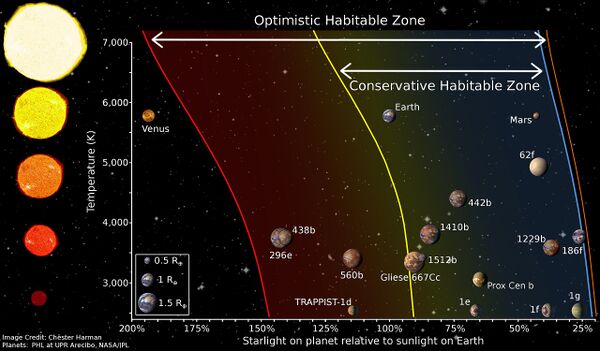Difference between revisions of "Habitable Main Planets"
Cholmondely (talk | contribs) (Page Created) |
Cholmondely (talk | contribs) (Added graphic - but it really needs to go with Planetary Systems when I do the page. Stranger here means Habitable Size - not Habitable Zone!) |
||
| Line 1: | Line 1: | ||
| + | [[File:Habitable Zone Regions.jpeg|600px|thumb|right|Habitable Zone]] | ||
| + | |||
== Overview == | == Overview == | ||
| Line 5: | Line 7: | ||
This OXP redefines the vanilla game's planet database to adopt more realistic values. | This OXP redefines the vanilla game's planet database to adopt more realistic values. | ||
| − | Habitable Main Planets was developed to adopt ''PlanetEngine'', integrated with Planetary Systems | + | Habitable Main Planets was developed to adopt ''PlanetEngine'', integrated with [[Planetary Systems]] from [[Strangers World]], for the main planets of a solar system. PlanetEngine calculates atmospheric temperatures and pressures depending on the planet mass and the insolation/solar radiance level. But some of the vanilla game's main planets have unrealistically low radii to be able to be densely populated worlds. |
The PlanetEngine with Habitable Main Planets gives more realistic data for the main planets. | The PlanetEngine with Habitable Main Planets gives more realistic data for the main planets. | ||
Revision as of 09:35, 10 December 2020
Overview
Can a planet with a radius of a mere 3000 km possibly be an advanced agriculture world with a population of billions of residents? Definitely no way! Such a planet is far too small to maintain a dense and warm atmosphere. If it were located in the habitable zone of a solar system, then that small planet would have an extremely rarefied atmosphere with an atmospheric pressure of a few millibars - or less!
This OXP redefines the vanilla game's planet database to adopt more realistic values.
Habitable Main Planets was developed to adopt PlanetEngine, integrated with Planetary Systems from Strangers World, for the main planets of a solar system. PlanetEngine calculates atmospheric temperatures and pressures depending on the planet mass and the insolation/solar radiance level. But some of the vanilla game's main planets have unrealistically low radii to be able to be densely populated worlds.
The PlanetEngine with Habitable Main Planets gives more realistic data for the main planets.
- Range of main planets radii redefined from vanilla 2820...6911 km to 2505...7496 km. As a result average planet radius is increased from vanilla 4870 to 5465 km.
- Minimum radii of planets with biomarkers in their descriptions (such as trees, forests, oceans etc) are increased to 5425 km.
- Minimum radii of agricultural planets with TL > 3 AND without biomarkers are increased to 4450 km.
- Radii of all above listed planets are proportionally scaled using 6400 km radius as a reference point.
- Radii of some Famous Planets are readjusted individually using the above-mentioned rules of thumb.
- Minimal air pressure at surface level for planets with biomarkers is approximately 0.5 bar, permitting flourishing natural ecosystems and outdoor activities without breathing equipment.
- Minimal air pressure at surface level for agricultural planets or Famous Planets without biomarkers is approx. 0.2 bars, permitting outdoor activity without pressurized suits, but needing breathing equipment. It seems too harsh an environment for advanced agricultural worlds, but hydroponic farms could be a solution.
- Small agricultural planets with TL < 4 have too low an air pressure to permit any outdoor activity without pressurized suits. Due to a new legend such planets are mining worlds, but it is a different story.
More information about the PlanetEngine will be found in the relevant topic.
Dependencies
Habitable Main Planets OXP can be used per se as pure ambience, but it provides a more realistic background for the game's PlanetEngine. So Sun Gear and the Planetary System OXPs are recommended as well.
Habitable Main Planets is obligatory for Sun Gear.
Known Issues
Unfortunately this readjusting did not completely eliminates conflicts with the vanilla Oolite descriptions such as The planet Atrare is cursed by vicious mountain monkeys (Atrare is a poor industrial planet with an insufficient radius of 3144 km). Procedural generation is so procedural :-)
Setting the minimal radius to 4250 km or above will partially solve the problem, but I prefer to allow more variation in the main planet physical conditions. If you plan terraforming missions for a planet with almost zero atmosphere pressure, it will be a rather poor target, won't it?
The distance between the witchpoint and the main planet in the vanilla game is a pseudo-random value in the range 10...14 times the main planet radius. Since Oolite 1.82 this distance has been defined as an absolute value – parameter planet_distance. Therefore increasing Lave's vanilla radius from 4116 km to 5821 km (for example) will only slightly affect the distance from the witchpoint to the main orbital station - and the corresponding travel time. The main orbital station is always positioned at a distance from the main planet surface equal to the main planet radius: so some OXPs using absolute coordinates for positioning additional objects will not function as intended after installing Habitable Main Planets (eg the Tionisla cemetery).
UPD
Improved visual appearance of all main planets is included with Habitable Main Planets since version 1.5. See my BB post of 25.10.2020 for more details.
This Version
Current OXZ - Version 1.6.0. Uploaded 08 December 2020.
Links
- Bulletin Board Discussion
- Strangers World This is the foundational OXP for the Strangers World variant of Oolite. It can of course be used just by itself!
